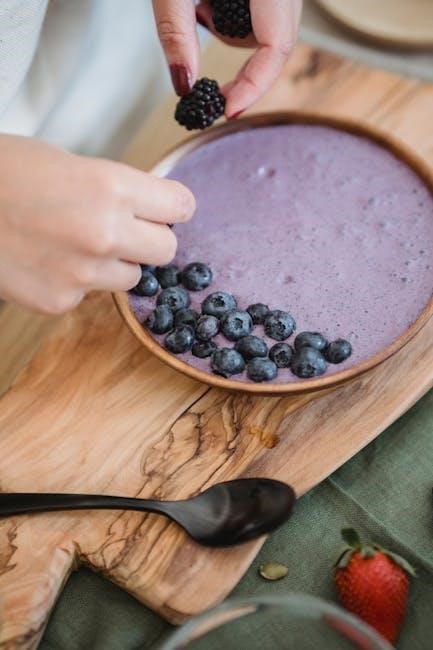
anti inflammatory food list pdf
An anti-inflammatory diet focuses on nutrient-dense, minimally processed foods to reduce chronic inflammation, promoting overall health and immune function. It emphasizes whole foods, omega-3 rich options, and fiber.
Understanding the Role of Nutrition in Reducing Inflammation
Nutrition plays a pivotal role in managing inflammation by providing essential nutrients that combat pro-inflammatory processes. Diets rich in omega-3 fatty acids, antioxidants, and fiber help mitigate chronic inflammation, which is linked to conditions like arthritis and heart disease. Avoiding processed foods, trans fats, and refined sugars minimizes inflammation triggers. Incorporating anti-inflammatory foods supports immune health and reduces oxidative stress, promoting long-term well-being. A balanced diet not only reduces inflammation but also enhances overall bodily functions, making it a cornerstone of preventive health strategies.

Best Anti-Inflammatory Foods
Fatty fish, leafy greens, berries, walnuts, flaxseeds, and mushrooms are among the top anti-inflammatory foods, offering omega-3s, antioxidants, and fiber to combat inflammation and improve health.
Fatty Fish: Salmon, Sardines, and Mackerel
Fatty fish like salmon, sardines, and mackerel are rich in omega-3 fatty acids, particularly EPA and DHA, which are potent anti-inflammatory agents. These fish help reduce inflammation by inhibiting pro-inflammatory molecules, making them beneficial for conditions like arthritis and heart disease. Regular consumption supports brain health, improves immune function, and lowers chronic inflammation levels. Incorporating fatty fish into your diet can also enhance the effectiveness of anti-inflammatory meal plans and promote overall wellness.
Leafy Greens: Spinach, Kale, and Collard Greens
Leafy greens like spinach, kale, and collard greens are packed with antioxidants and fiber, making them powerful anti-inflammatory foods. Rich in vitamins A, C, and K, these greens contain compounds like kaempferol, which reduces inflammation. Kale is particularly high in antioxidants, while collard greens provide anti-inflammatory glucosinolates. Adding these greens to meals or smoothies can help combat chronic inflammation and support immune health. Their versatility makes them a cornerstone of anti-inflammatory diets, promoting overall wellness and reducing the risk of inflammatory diseases. Incorporate them regularly for a nutrient-dense, inflammation-fighting diet.
Berries: Cherries, Blueberries, and Blackberries
Berries, such as cherries, blueberries, and blackberries, are rich in antioxidants called anthocyanins, which are potent anti-inflammatory agents. Cherries have been shown to reduce inflammation and muscle soreness, making them ideal for athletes. Blueberries are packed with antioxidants that support brain health and may reduce cognitive inflammation. Blackberries contain anti-inflammatory compounds like ellagic acid, which supports immune function and digestion. Incorporating these berries into your diet can help combat chronic inflammation and improve overall well-being. Their versatility allows them to be enjoyed fresh, in smoothies, or as a topping for anti-inflammatory meals.
Omega-3 Rich Foods: Walnuts and Flaxseeds
Walnuts and flaxseeds are excellent sources of omega-3 fatty acids, particularly alpha-linolenic acid (ALA), which plays a crucial role in reducing inflammation. Walnuts are also rich in antioxidants and polyphenols, making them a powerful anti-inflammatory food. Flaxseeds, high in fiber and lignans, support gut health and immune function. Both foods help lower inflammation by balancing omega-6 and omega-3 fatty acids in the body. Incorporating them into meals, such as adding walnuts to oatmeal or flaxseeds to yogurt, can enhance the anti-inflammatory benefits of your diet. Their ability to improve heart health and brain function makes them essential additions to an anti-inflammatory lifestyle.
Mushrooms: Shiitake, Enoki, and Maitake
Mushrooms like shiitake, enoki, and maitake are celebrated for their anti-inflammatory properties. Shiitake mushrooms contain lentinan, a polysaccharide that boosts immune function and reduces inflammation. Enoki mushrooms are rich in antioxidants and have been shown to suppress inflammatory pathways in the body. Maitake mushrooms, known as “hen-of-the-woods,” contain beta-glucans that support immune health and fight inflammation. These varieties are versatile and can be easily incorporated into meals, such as stir-fries, soups, or salads. Their unique flavors and textures make them a flavorful addition to an anti-inflammatory diet while providing significant health benefits. Adding mushrooms to your meals can enhance both nutrition and taste, aiding in chronic inflammation management.

Foods to Avoid
Processed foods, trans fats, and refined sugars are pro-inflammatory and should be avoided. These foods trigger inflammation and harm overall health, contributing to chronic diseases.
Processed Foods: White Flour Products and Sugary Snacks
Processed foods, such as white flour products and sugary snacks, are high in empty calories and pro-inflammatory agents. They include items like bread, pastries, and cereals made from refined grains. These foods cause a rapid spike in blood sugar, leading to inflammation. Regular consumption can impair liver function and contribute to chronic diseases. It’s essential to limit these items and opt for whole, nutrient-dense alternatives instead. Mindful eating and balanced diets help reduce inflammation and support overall well-being.
Pro-Inflammatory Foods: Trans Fats and Refined Sugars
Trans fats and refined sugars are notorious pro-inflammatory foods that trigger chronic inflammation. Found in fried foods, baked goods, and processed snacks, trans fats disrupt cell function. Refined sugars, like those in sodas and candies, cause inflammation by promoting insulin resistance. Both contribute to conditions like heart disease and diabetes. Eliminating these from your diet is crucial for reducing inflammation. Opting for natural sweeteners and healthy fats supports immune health and overall well-being.

Meal Planning and Recipes
Discover structured 7-day anti-inflammatory meal plans and easy recipes to heal the immune system. These guides offer practical, nutrient-dense options to incorporate into your daily routine.
7-Day Anti-Inflammatory Meal Plan
A well-structured 7-day meal plan can help reduce inflammation by incorporating nutrient-dense foods. Each day includes breakfast, lunch, dinner, and snacks, focusing on omega-3 rich fish, leafy greens, and berries. Start with oatmeal topped with walnuts and cherries for breakfast. Grilled salmon with quinoa and steamed spinach makes a balanced lunch. Evening meals might feature roasted sweet potatoes and broccoli. Snacks include flaxseeds and blueberries. The plan ensures variety, providing a comprehensive approach to anti-inflammatory eating. Printable PDF versions are available for easy grocery shopping and meal preparation, helping you stay consistent with your dietary goals. This structured plan supports immune health and overall well-being.
Easy Recipes for Immune System Health
Simple, immune-boosting recipes are essential for maintaining health. A berry and walnut smoothie combines antioxidants and omega-3s, while grilled salmon with roasted vegetables offers a balanced dinner. Quinoa salads with spinach and cherries provide fiber and vitamins. Turmeric-infused soups and stir-fries with shiitake mushrooms add anti-inflammatory benefits. These recipes are easy to prepare and use ingredients from the anti-inflammatory food list. They promote vitality and reduce inflammation, supporting long-term immune health and overall well-being. Printable PDF guides make meal prep effortless, ensuring a consistent and nutritious diet. These dishes are both delicious and therapeutic, making them ideal for everyday meals.
The Mediterranean Diet
The Mediterranean diet is a traditional anti-inflammatory dietary pattern inspired by Mediterranean regions, emphasizing whole foods, fruits, vegetables, whole grains, nuts, seeds, and healthy fats like olive oil.
A Traditional Anti-Inflammatory Dietary Pattern
The Mediterranean diet is a well-studied model of anti-inflammatory eating, emphasizing whole grains, fruits, vegetables, legumes, and healthy fats like olive oil. It prioritizes unprocessed foods, limiting red meat and refined sugars. This dietary pattern has been shown to reduce chronic inflammation by incorporating antioxidants, fiber, and omega-3 fatty acids. Key components include olive oil, garlic, herbs, and moderate wine consumption. The diet’s balance and variety support immune health and long-term well-being, making it a sustainable choice for those seeking to adopt an anti-inflammatory lifestyle. Its traditional roots and scientific backing make it a cornerstone of anti-inflammatory nutrition.
Incorporating Anti-Inflammatory Foods into Daily Life
Start with small dietary changes, using a printable anti-inflammatory food list for grocery shopping and meal planning to simplify the process and make healthy choices easier.
Printable Anti-Inflammatory Foods List PDF
A printable anti-inflammatory foods list PDF offers a convenient guide to identifying beneficial foods and avoiding pro-inflammatory options. This resource provides a categorized breakdown of nutrient-dense foods, including fatty fish, leafy greens, berries, and omega-3 rich ingredients. It also highlights foods to avoid, such as processed items and refined sugars. Designed for easy reference, the PDF simplifies grocery shopping and meal planning. Users can print it for quick access, ensuring they make informed dietary choices. This tool is especially useful for those aiming to reduce chronic inflammation and improve overall health. By following the list, individuals can create balanced, anti-inflammatory meals effortlessly.